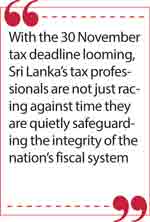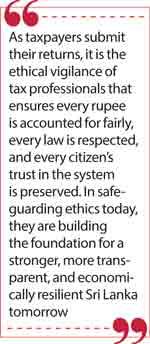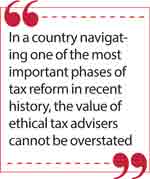Saturday Feb 21, 2026
Saturday Feb 21, 2026
Wednesday, 26 November 2025 00:20 - - {{hitsCtrl.values.hits}}

 With the 30 November tax deadline looming, Sri Lanka’s tax professionals are not just racing against time they are quietly safeguarding the integrity of the nation’s fiscal system. Their desks are full, their phones never stop ringing, and their evenings often stretch late into the night. But their work in this busy season is only one part of a much bigger role. Today, tax professionals are also essential guardians of ethical tax behaviour and public trust in Sri Lanka’s tax system.
With the 30 November tax deadline looming, Sri Lanka’s tax professionals are not just racing against time they are quietly safeguarding the integrity of the nation’s fiscal system. Their desks are full, their phones never stop ringing, and their evenings often stretch late into the night. But their work in this busy season is only one part of a much bigger role. Today, tax professionals are also essential guardians of ethical tax behaviour and public trust in Sri Lanka’s tax system.
In a country navigating one of the most important phases of tax reform in recent history, the value of ethical tax advisers cannot be overstated. They help taxpayers meet their duties honestly, support the government’s revenue goals, and strengthen fairness in society. This article explains why their contribution matters, what ethical practice means, and how their work shapes Sri Lanka’s path toward economic stability.
A profession under pressure
Tax professionals sit in a challenging space. They must understand complex laws, answer difficult questions from clients, manage tight deadlines, and keep up with rapid changes in regulations. These pressures are most visible in November, but they continue throughout the year.
Some of the pressures they face today include:
These conditions make ethical decision-making just as important as technical expertise. In fact, ethics has become a defining feature of the profession.
What ethical tax practice really means
Taxation is more than a financial activity. It reflects a social contract, a shared responsibility between citizens and the state. Ethical tax practice ensures that this responsibility is carried out in a fair, honest, and respectful way.
 Tax professionals are at the centre of this relationship. Their work touches every stage of tax compliance: from interpreting laws and checking documents to advising clients and submitting returns. Ethical practice includes:
Tax professionals are at the centre of this relationship. Their work touches every stage of tax compliance: from interpreting laws and checking documents to advising clients and submitting returns. Ethical practice includes:
nProfessional behaviour – Acting in ways that uphold public trust
These principles align with international ethics frameworks, such as the International Ethics Standards Board for Accountants (IESBA) Code of Ethics, widely used around the world.
Advisers, teachers, and moral guides
For many Sri Lankans, taxation is still a complex subject. Forms can feel confusing, rules can be hard to understand, and digital systems can be intimidating. Tax professionals help bridge this gap. Their work involves not only calculations and paperwork, but also education and guidance.
They help taxpayers understand:
Ethical advisers also highlight the difference between legitimate tax planning and questionable tax avoidance. This distinction is important because actions that are technically legal may still weaken fairness or violate the spirit of the law.
By educating their clients, tax professionals strengthen tax morale, people’s willingness to pay taxes because they understand its value.
Difficult choices and real-world ethical dilemmas
Ethical tax professionals often face tough situations. Some clients may try to influence them to hide income, overstate expenses, or ignore rules. Others may argue that “everyone does it” or that small errors “don’t matter.”
Examples of common dilemmas include:
 In these moments, tax professionals must choose between losing a client and compromising their ethical responsibilities.
In these moments, tax professionals must choose between losing a client and compromising their ethical responsibilities.
Their refusal to support dishonest practices protects not just themselves but also the entire tax system. Sri Lanka’s already low tax-to-GDP ratio shows how much revenue the country loses to weak compliance. Ethical tax professionals help reduce this loss and strengthen stability.
Ethics in a digital era
Sri Lanka’s tax administration is becoming more digital. Systems like RAMIS, e-filing portals, and electronic data checks make tax reporting more transparent and traceable. This shift reduces opportunities for evasion but raises new expectations for ethical conduct.
Tax professionals must ensure:
Digital systems make errors or dishonesty easier to detect. This makes ethical behaviour essential not only for legal compliance but for protecting professional reputation.
Why ethical professionals are key to national progress
Sri Lanka’s economic recovery depends heavily on effective revenue mobilisation. But laws and systems alone are not enough. The country needs people who are committed to fairness, accountability, and professionalism.
 Ethical tax professionals contribute to national development in several ways:
Ethical tax professionals contribute to national development in several ways:
1 They support revenue collection
Accurate filings increase government funds for services like education, health, and public transport.
2 They strengthen public confidence
When taxpayers receive honest and consistent advice, they view the system as fair.
3 They reduce enforcement costs
Fewer violations mean fewer audits and investigations, allowing authorities to work more strategically.
4 They improve the investment climate
A transparent and reliable tax environment attracts global
investors.
5 They align Sri Lanka with global standards
Ethical practice supports long-term goals such as the Sustainable Development Goals (SDGs), especially those linked to accountability and strong institutions.
Raising the bar: How the profession can lead change
Tax professionals can further strengthen ethical practice through:
These steps can help build a more trustworthy and effective tax environment.
A shared responsibility for a fairer future
As taxpayers submit their returns, it is the ethical vigilance of tax professionals that ensures every rupee is accounted for fairly, every law is respected, and every citizen’s trust in the system is preserved. In safeguarding ethics today, they are building the foundation for a stronger, more transparent, and economically resilient Sri Lanka tomorrow.
(The writer is an independent researcher.)